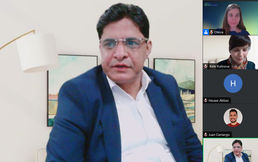Tech & International Development
Webinar
In today's world, technology is a powerful engine driving international development. From innovative digital technologies to cutting-edge scientific research, technology is not only changing our way of life but also profoundly shaping the future of global society. In this rapidly changing era, we are witnessing how technology transcends borders and is swiftly becoming a bridge connecting the world and injecting new vitality into global development.

On the evening of January 13, the first online seminar of the THINC Fellowship (2023-24) was officially held via Voov Meeting, with members of the "International Development" group from different fields sharing their perspectives on the role of technology in driving international development. Over 50 of the participants were on site.
Panel 1: Tap into International Agencies

Economist Marco Alberto Carrasco Villanueva, Founder of the Climate Education Service Project; Jessica Yanyun Li, Researcher at the United Nations Sustainable Development Solutions Network; Wing Yu Carter Cheng, Founder of the First Hope Initiative; Certified Coach Hauwa Abbas; and Learning and Development Manager at MasterCard Christina Huang shared the role of technology in the operations of different international agencies and the challenges they currently face.
Marco Carrasco shared a case from the Interamerican Development Bank (IDB) where new technology was employed to promote children's health: using smartphones and artificial intelligence to measure childhood anemia. By simply taking a photo of the eyes and having artificial intelligence analyze the photo, the system can determine the state of a child's anemia, significantly simplifying the diagnostic process and reducing costs.

Carter Cheng, drawing on her experiences with climate issues, pointed out how new technologies can effectively reduce operating costs.

Panel 2: Targeted Practices in Specific Fields

Juan C. Camargo, Director of Global Cooperation and Innovation at Elevate Colombia; Nancy Carolina Fabara Verdezoto, Lawyer and International Business Consultant; Melodi Kaya, Co-founder of Nuva.ai; Richard Gray, Founder and Chairman of Open Foreign Policy Initiative; Kate Kalinova, Head of Business Engagement and International Affairs at Solutions for Our Climate; and Altaf Hussain, Head of EDC Sukkur IBA, shared their practical experiences in combining the latest technologies with their respective fields.

Richard Gray pointed out that although technological development has brought great convenience to various fields, one must never overlook the security concerns of technology when enjoying these conveniences. While technology has effectively addressed many security issues as a method of connection, many issues requiring careful consideration for large-scale projects involving national security remain.

Kate Kalinova mentioned that current policies in different countries regarding environmental and climate issues require companies to assess and disclose more information about their emissions, involving complex steps where technology plays a crucial role.

As for technological advancements in the media industry, Melodi Kaya believed that while the latest technology can produce high-quality video content in several seconds, technology alone cannot convey the characteristics of a brand or individual. Only content designed and expressed with care can truly resonate with users.

Discussion:International Payments
With increasingly closer economic ties between countries, international payments have become a familiar thing. Whether it's for business trade or personal travel and learning abroad, foreign currency payments are always involved. The development of technology has facilitated the convenience of payments: avenues like Weixin Pay allow us to use electronic payments easily--even when abroad. During this open discussion, THINC Fellows discussed the development and challenges of international payments in different countries and regions.

Hauwa Abbas believed that many African countries are lagging behind in the development of electronic payments. During the COVID-19 pandemic, many banks in Nigeria suspended their international payment services. Fewer than 1% of people holding bank cards from other countries were unaffected by this restriction, leaving the majority unable to settle transactions in foreign currencies.

Carolina Fabara studied and lived in China, where life was very convenient. With Weixin Pay and a host of online shopping platforms, many people in China no longer carry cash. In Latin America, most countries do not yet have such advanced technology. Fabara suggested that other countries should learn from China's example, improve national policies, enhance technological levels and popularize mobile payments.


